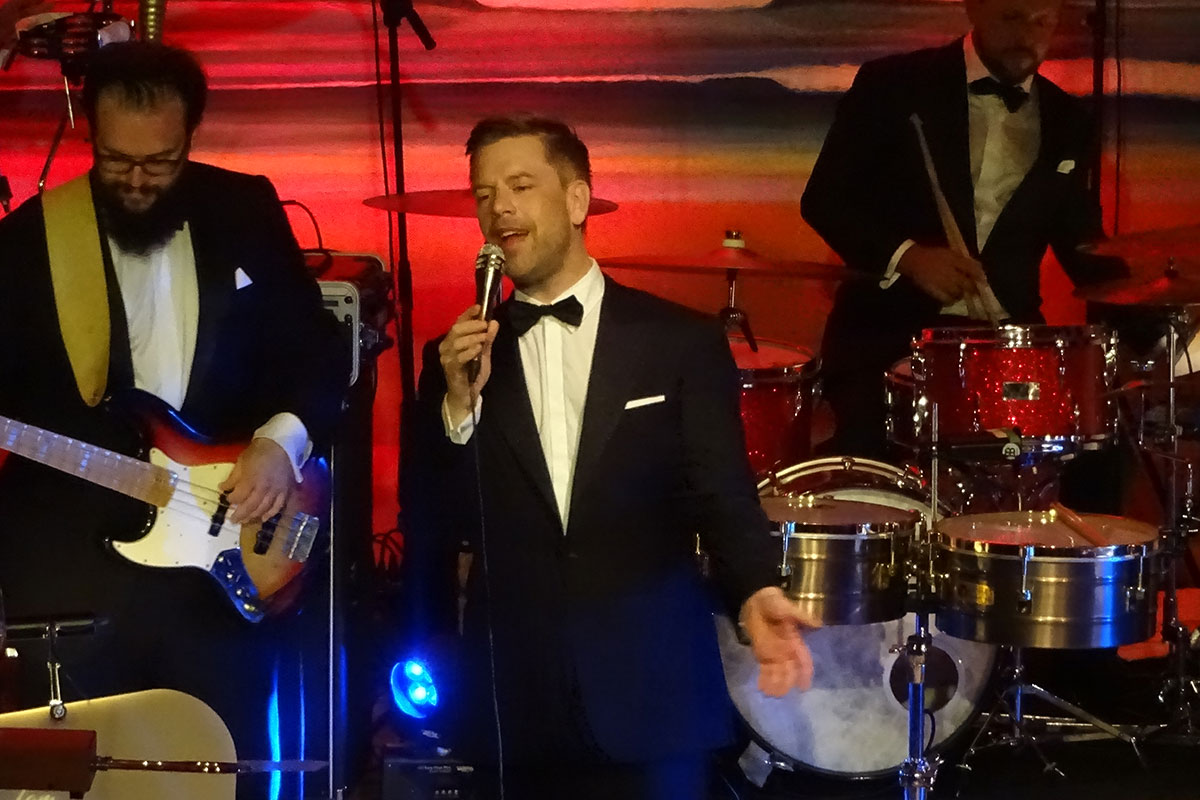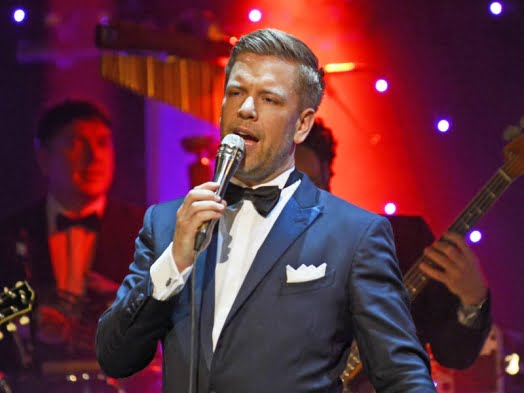Jazz interview with jazz singer and bandleader Tom Gaebel. An interview by email in writing.
JazzBluesNews.Space: – First let’s start with where you grew up, and what got you interested in music?
Tom Gaebel: – I grew up in a small town in Germany called Ibbenbüren in a very music loving family. My father was a very dedicated fan of classical music especially opera. Me and my three brothers were encouraged to study musical instruments from an early age on. At six years old I took on the violin, the drums at 14 and the trombone at 17.
JBN.S: – What got you interested in picking up the jazz vocal? What teacher or teachers helped you progress to the level of playing you have today? What made you choose the jazz vocal?
TG: – I never saw myself as a vocalist because my voice was rather deep compared to the singers and bands I admired when I was a teenager. Bands like Queen, the Beatles, Simon and Garfunkel etc.
But at the age of 19 I discovered Frank Sinatra and a whole new world opened up to me. From that moment on his voice and that kind of music became my biggest influence.
At the time I was studying drums and trombone in the Netherlands, when a fellow student, who always had to listen to me singing along my Sinatra records, suggested that I should get some singing lessons. He probably thought that might be helpful – to me and him..;-)
JBN.S: – How did your sound evolve over time? What did you do to find and develop your sound?
TG: – I never thought of developing any special sound or way of singing. I just listened to the singers that I inspired me and tried to do what they did and to understand what I liked about this one singer more than about someone else. Over time I began to comprehend the musical language and developed my own way of “talking” naturally.
JBN.S: – What practice routine or exercise have you developed to maintain and improve your current musical ability especially pertaining to rhythm?
TG: – I am very fortunate to have practiced so many years on different instruments. All of them have helped me to understand and hopefully master certain aspects or difficulties of music.
I would argue that drums are the most important instrument in Jazz. It’s all about the timing! When you are singing swing or Jazz and you do not “swing”, then everything crumbles down to nothing. You do not have to get every note or always sing in tune, but you have to “swing” or groove. Playing the drums helps immensely in that regard!
JBN.S: – Which harmonies and harmonic patterns do you prefer now?
TG: – I am not a very modern guy. I love harmonies, melodies, and rich orchestration – be it Big Band or Classical music. I’m somewhat stuck in the fifties and sixties. Modern classical music or Jazz does not get to me in the same way.
My brother Denis is one of Germanys best saxophone players and he is much more into modern styles. Through him I heard and learned a lot of different styles which would not feel natural to me.
Nowadays I think I can make the distinction between “this is bad” and “this is just not my taste”.
JBN.S: – Many aspiring musicians are always looking for advice when navigating thru the music business. Is there any piece of advice you can offer to aspiring students or even your peers that you believe will help them succeed and stay positive in this business?
TG: – I must be honest, I was very lucky to have the right people helping me. Starting with the guy convincing me to get some serious vocal lessons.
Luckily in Jazz to be good in what you do still means a lot. Nevertheless, to be successful there is a lot more that is important. Other than being lucky you have to be interested in what you do. There are many players that may not be as good as others, but they are doing their own thing, and they are very successful. You have to convince people other than the regular crowd to listen to your music to be successful in Jazz.
In my own case I have the benefit of loving and singing music which many other people also like. Thus, I am more commercial in what I am doing without doing something different than I would want to.
JBN.S: – Аnd furthermore, can jazz be a business today or someday?
TG: – I guess it will always be a small business compared to other musical styles, but that is as well the beauty of it: People who are doing Jazz dedicate their time practicing not wondering about commercial success. It is all about the love of music. There are many popular styles of music, which no one would dedicate to spend their life with, if there was no commercial benefit. It is bizarre, when you think about it.
JBN.S: – Which collaboration have been the most important experiences for you?
TG: – I have sung with a lot of classical orchestras in recent years, who wanted to do some Sinatra repertoire. That is the most amazing sound to me: A Jazz Big Band plus strings and everything. This is like a dream come true!
JBN.S: – How can we get young people interested in jazz when most of the standard tunes are half a century old?
TG: – Jazz just like classical music, is appreciated highly by people who have learned instruments themselves at one point in their lives. It is a musical language with more words you must learn to understand and speak it. But once you do it is probably much bigger and more satisfying than other styles.
So, giving more children the chance to learn an instrument, helps a lot in that regard. Musical education will result in more children listening to music which is harder to digest, including Jazz.
JBN.S: – John Coltrane said that music was his spirit. How do you understand the spirit and the meaning of life?
TG: – I do not think there is a special meaning of life other than what you make of it. By sheer luck we come into existence. So as a first reminder you should be thankful and try to be a nice and good person. It can be a relief not to look for meaning everywhere when perhaps there is none to find.
JBN.S: – What are your expectations of the future? What brings you fear or anxiety?
TG: – At this moment only that my next album will not be finished on time…;-)
JBN.S: – If you could change one thing in the musical world and it would become a reality, what would that be?
TG: – I would love to get the sound of the old recordings back. Somehow there was something going on in recording up until the seventies that was very charming to the music as well in Jazz as in Pop Music. Everybody talks about it, but in a way, it is so difficult to achieve. Let’s start with a big recording room and having a lot of real musicians playing real instruments – at the same time!
JBN.S: – Who do you find yourself listening to these days?
TG: – The last weeks I spent listening to old recordings of various bands and styles and tried to get as much live footage of old recordings. Simply to solve the mystery of what they were doing right in those days.
I have to say, it is not only about swing. It is also about the sound – your own sound and the sound of your recordings.
JBN.S: – Let’s take a trip with a time machine, so where and why would you really wanna go?
TG: – I would love to be in recording studio in the fifties and sixties, witnessing all the great musicians and bands still alive and in their prime and recording the sound that I love so much.
Interview by Simon Sargsyan







More Stories
Interview with Janis Siegel of The Manhattan Transfer: Jazz, being a more refined, interpreted form of music
CD review: George Benson – Dreams Do Come True: When George Benson Meets Robert Farnon – 2024: Video, CD cover
The band was tight as ever. The Warren Haynes Band cuts loose: Video, Photos